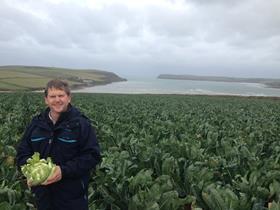
Most UK cauliflower growers don’t want the responsibility of supplying a retailer’s full winter cauliflower requirements, a Cornwall grower has claimed, following food waste concerns and controversy surrounding Spanish imports raised in a recent Sunday Timesreport
Wastage has been particularly severe this winter due to a gap in supply in November and December, which meant there was a flush in February once the crop had built up. In theSunday Timesarticle, it was reported that Kent-based grower Geoffrey Philpott was planning to plough up £60,000 worth of cauliflowers.
Greville Richards, the MD of Cornwall-based brassica producer Southern England Farms, expressed support for British supermarkets’ policy of sourcing a proportion of their winter cauliflowers from Spain. “I can’t see how it can be done any other way,” he said.
The Sunday Times report claimed that UK retailers are creating large quantities of food waste by importing Spanish produce in favour of British cauliflowers. But Richards argued that while growers want “a good sizeable contract” from their retail customers, they don’t want to be responsible for fulfilling a supermarket’s entire cauliflower requirements.“We’re bypassing a bit of cauliflower at the moment,' he said. 'We have been for the last two weeks. But, as much I hate to say it, that is supply and demand.'
Retailers tend to have more than one British supplier as well as a Spanish cauliflower programme during the winter season, and Richards, who supplies Tesco and Sainsbury’s, said he wouldn’t want to do even 50 per cent of either supermarket’s winter volume.
“You can get a bad winter where you lose a lot of the crop and you wouldn’t want to be responsible for fulfilling your contract,” he said. “The retailers also want to mitigate their risks in the winter months because as much as this year has been quite a good winter for growing cauliflower, we’ve had it in the past where we haven’t had any cauliflower for three weeks. That’s the whole reason why there’s a Spanish supply in the winter.”
The proportion of cauliflower brought in from European suppliers typically varies from 30 to 50 per cent depending on the retailer, according to Richard Mowbray, managing director of Lincolnshire and Cornwall grower TH Clements.
Mowbray, who is also vice chairman of the Brassica Growers Association, added that Kent can be particularly unreliable in the winter months due to cold easterly winds. “There’s been a general shift away from Kent over the last ten years – mainly towards Cornwall but also to Spain,” he said.
Richards stressed that he had “every sympathy” with Philpott, who was featured in the Sunday Times piece, but argued it would be unreasonable to expect British retailers to halt their European cauliflower programmes just because British growers have too much crop at the moment.
“If a Spanish grower has a contract for 20-30 per cent [of a retailer’s cauliflower supply], they expect for that contact to be honoured all season,” he said. “You can’t expect them to grow a programme and then suddenly have it turned off.”
Despite this, Mowbray fully expects British growers to take on a bigger percentage of the retailer’s winter cauliflower production in the coming years as Brexit makes domestic produce more attractive. “With the exchange rate now it’s a lot more expensive for retailers to bring in cauliflower from Spain,” he explained. “Some of our customers are already asking whether we would be interested in doing some more cauliflower next winter.”
Richards believes growers will be prepared to take on more responsibility than they do at present but believes “there will always be a programme going to Spain.”
In an effort to utilise as much surplus cauliflower as possible and avoid food waste when yields are high, British growers have been turning to food waste charities such as Feedback. Unfortunately, the wastage “far outweighs the demand from local food banks”, according to Richards. “It’s inevitable you’ll end up chopping some up.”



